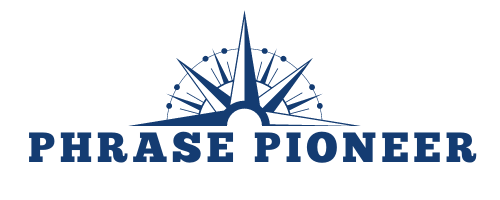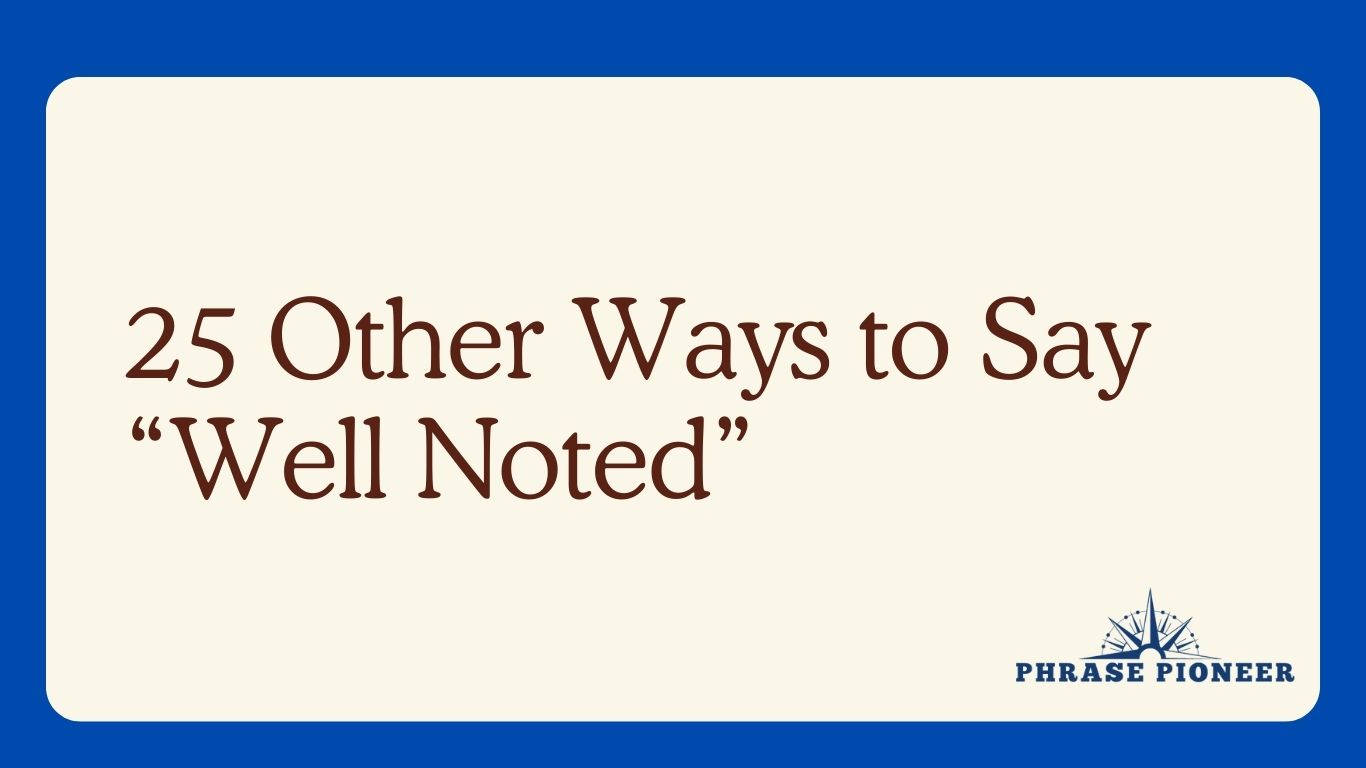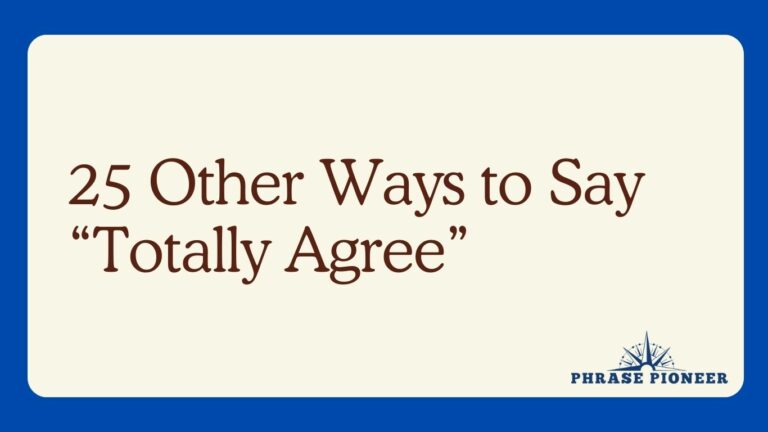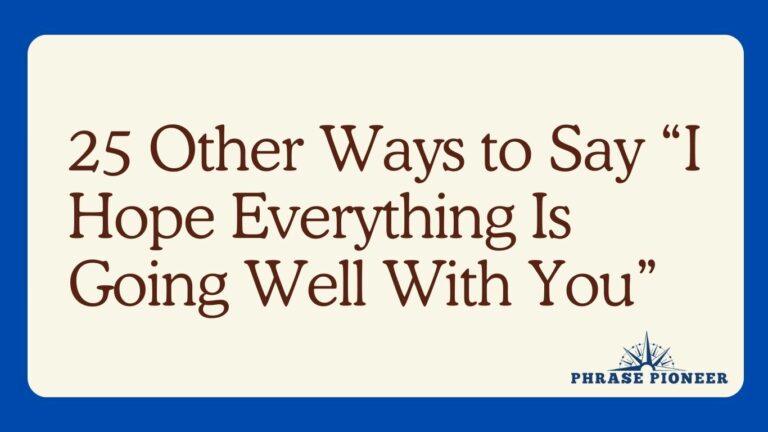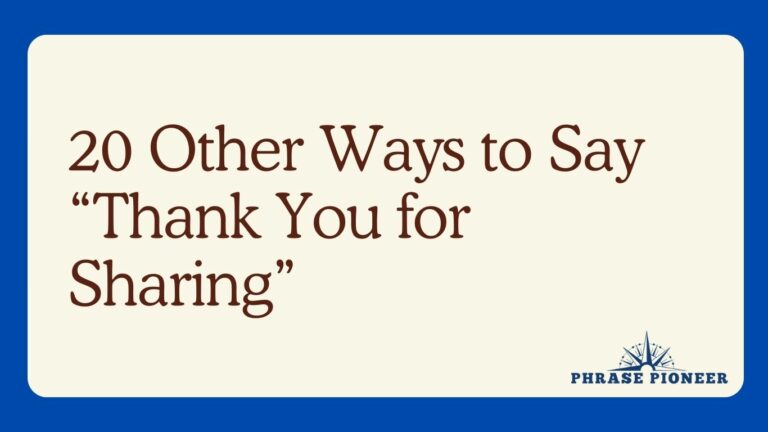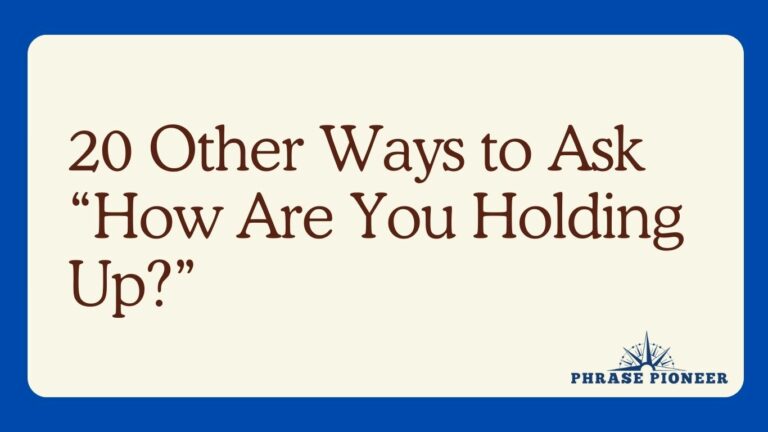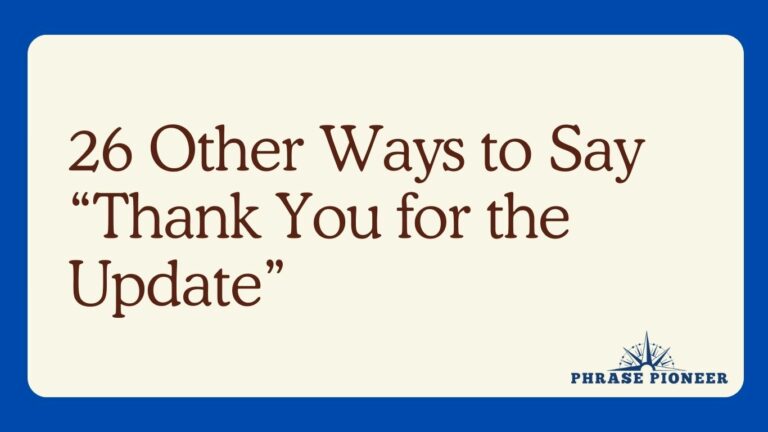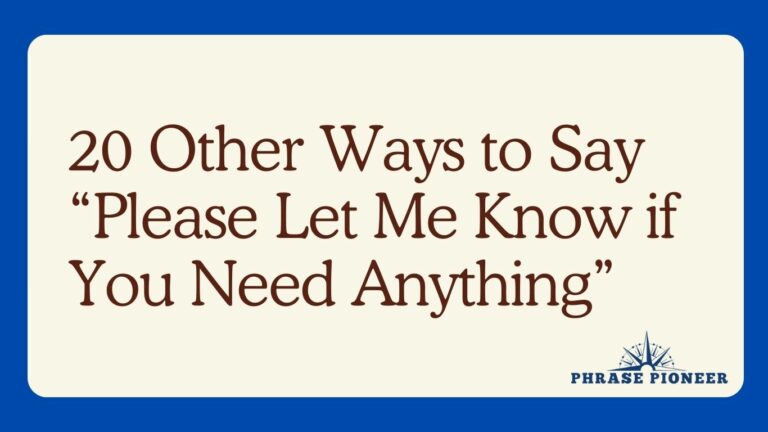25 Other Ways to Say “Well Noted”
Acknowledging someone’s comments or input is a key aspect of effective communication. Saying “Well noted” is a concise way to convey that you’ve understood and recorded what was said, but there are times when variety in expression can enhance the interaction or better fit the context.
Let’s explore 25 alternative ways to say “Well noted,” accompanied by an example and an explanation for each.
Formal Acknowledgments
Your point is duly noted.
- Example: “Thank you for your perspective; your point is duly noted,” said the secretary during the meeting.
- Explanation: This statement is appropriate for formal settings, implying careful consideration of the point made.
I have taken note of your comments.
- Example: The manager responded, “I have taken note of your comments, and they will be addressed in our action plan.”
- Explanation: It conveys not just acknowledgment but also the intent to respond or act upon the comments received.
Acknowledged with thanks.
- Example: Replying to the email, she wrote, “Acknowledged with thanks. We will proceed accordingly.”
- Explanation: This polite phrase not only indicates that the message is understood but also expresses gratitude.
Concise Confirmations
Noted with appreciation.
- Example: “Noted with appreciation. Your feedback is invaluable,” the developer told the beta tester.
- Explanation: This response shows not just acknowledgment but an appreciation for the input received.
I’ve recorded your input.
- Example: The researcher said, “I’ve recorded your input; it will be invaluable for our study.”
- Explanation: This indicates that the speaker is seriously considering and documenting the input provided.
Point taken.
- Example: During the intense debate, he interjected with a simple, “Point taken. Let’s move on.”
- Explanation: It’s a pithy way to convey that you’ve accepted the point made and are ready to proceed.
Affirmative Replies
Your observations have been registered.
- Example: “Your observations have been registered, and we will certainly look into them,” confirmed the committee chair.
- Explanation: This formal phrase ensures the speaker that their observations are logged and will be reviewed.
Received and understood.
- Example: “Received and understood,” she responded crisply over the walkie-talkie.
- Explanation: This is direct and to the point, often used in situations requiring clarity and brevity.
I hear you loud and clear.
- Example: In the team huddle, the coach said, “I hear you loud and clear. We’ll adjust the strategy accordingly.”
- Explanation: It affirms that not only has the message been received, but its importance is fully understood.
Gentle Receptions
I appreciate your input.
- Example: “I appreciate your input; it adds a new dimension to our discussion,” he reflected after the presentation.
- Explanation: This phrase is a softer way of noting the information while explicitly valuing the contributor’s effort.
Your contribution is acknowledged.
- Example: The facilitator noted, “Your contribution is acknowledged, and it’s vital for our collective understanding.”
- Explanation: This is a considerate response that provides acknowledgment without being overly formal.
That’s well observed.
- Example: “That’s well observed; we hadn’t considered that angle before,” the scientist conceded.
- Explanation: It credits the speaker for a keen observation and implies that it will be taken into account.
Professional Acceptances
Your remarks have been logged.
- Example: “Your remarks have been logged; we’ll revisit them in our review,” the quality control supervisor assured the staff.
- Explanation: This expression is suitable for professional contexts where comments are formally recorded for further action or review.
We acknowledge receipt of your message.
- Example: “We acknowledge receipt of your message and will update you with our decision soon,” the customer service representative emailed.
- Explanation: It’s a standard professional reply, often used in written correspondence to confirm receipt and understanding.
I’ll make a note of that.
- Example: “I’ll make a note of that; it’s an aspect we should consider more closely,” the planner stated during the session.
- Explanation: This phrase indicates intentionality in remembering and considering the information provided.
Positive Reinforcements
That’s an excellent point. Noted.
- Example: “That’s an excellent point. Noted,” the professor said, impressed by the student’s insight.
- Explanation: This affirmative response both praises the point made and confirms it has been taken on board.
Your feedback is well received.
- Example: “Your feedback is well received. We’re always striving to improve,” responded the hotel manager to the review.
- Explanation: This response acknowledges the feedback positively and portrays a willingness to act upon it.
That has been documented.
- Example: “That has been documented,” the lawyer stated as she made a note in the margins of her brief.
- Explanation: This phrase is often used to convey that a record has been or will be made of the information presented.
Reassuring Responses
I’ve made a mental note of that.
- Example: “I’ve made a mental note of that; it will be very helpful for our planning,” the event coordinator mentioned.
- Explanation: It provides reassurance that the point will be remembered without necessarily writing it down.
Your suggestion is on the record.
- Example: “Your suggestion is on the record, and we’ll consider it for our next steps,” the CEO reassured the shareholders.
- Explanation: It’s a formal way of saying that the suggestion has been officially noted and will be given due consideration.
You make a good point; it’s noted.
- Example: “You make a good point; it’s noted. We’ll see how we can integrate this into our guidelines,” the policy maker acknowledged.
- Explanation: This response signals agreement and a commitment to take the input into account.
Thoughtful Considerations
I value your perspective; it’s been noted.
- Example: “I value your perspective; it’s been noted. Thank you for sharing,” the workshop leader said warmly.
- Explanation: This expression conveys respect for the individual’s view and confirms it has been acknowledged.
That’s a noteworthy comment.
- Example: “That’s a noteworthy comment. I’ll ensure it’s mentioned in the meeting minutes,” the scribe said attentively.
- Explanation: It distinguishes the particular comment as significant enough to be specifically recorded or highlighted.
Thank you for that insight; I’ve noted it down.
- Example: “Thank you for that insight; I’ve noted it down. It will play a part in our final decision,” mentioned the judge.
- Explanation: This phrase shows acknowledgment and indicates the insight’s potential impact on future decisions.
Supportive Affirmations
I’ll take that into consideration.
- Example: “I’ll take that into consideration; your experience in the field is invaluable,” the project lead stated thoughtfully.
- Explanation: It suggests that the input isn’t just noted but will actively inform consideration and potentially shape outcomes.
Noted and supported.
- Example: “Noted and supported; we can definitely incorporate this in our community outreach initiative,” the organizer agreed.
- Explanation: This indicates not just acknowledgment but also a clear endorsement and intent to move forward with the idea.
Consider it recorded.
- Example: To the committee’s suggestion, the chairperson assured, “Consider it recorded. We value such detailed contributions.”
- Explanation: This is a solid affirmation that the suggestion has been registered for future reference.
In conclusion, effective communication often hinges on the ability to acknowledge others accurately and thoughtfully. Whether in writing or in person, these 25 alternatives to “Well noted” offer nuanced ways to confirm understanding, express appreciation, and build rapport. By carefully selecting from these responses, you can enhance your conversational skills and foster a collaborative atmosphere in any context.
